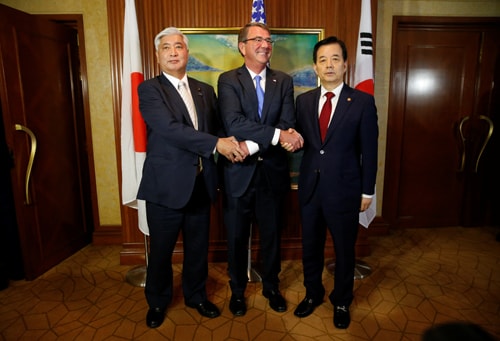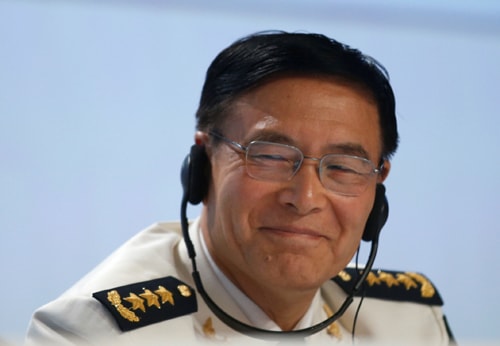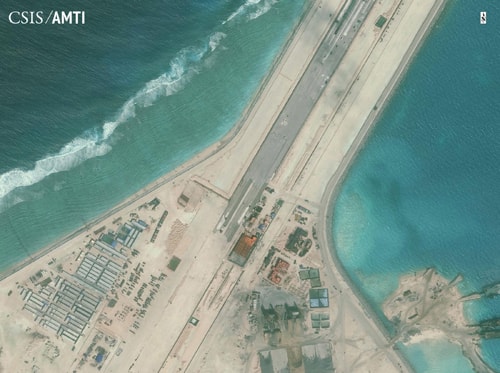US launches network to counter China in the East Sea
For the first time, the US has put forward a clear concept of a cooperation mechanism between countries to counter China's aggressive actions in the East Sea.
 |
Defense ministers of Japan, the US and South Korea shook hands on the sidelines of the Shangri-La Dialogue. Photo: Reuters |
When US Defense Secretary Ash Carter spoke at the Shangri-La Dialogue over the weekend, he used the word "principled" 38 times, expressing his vision of a US-backed "security network" linking countries in the region against China's assertive actions in the South China Sea, according to Reuters.
According to commentator Greg Torode, this Shangri-La Dialogue has witnessed a division of views among participating countries on the East Sea issue. Many countries such as the US, Japan, India, France and Vietnam have spoken out to demand that relevant parties respect international law to resolve the growing tensions in this strategic sea area, while China has brazenly declared that it will not comply with the international court's ruling on the East Sea.
Speaking at the Dialogue, Admiral Sun Jianguo, representative of the Chinese delegation, said that the country declared that Beijing "does not cause trouble but is not afraid of trouble", and asked other countries "not to point fingers at China", when many delegates questioned Beijing's policy in the East Sea.
Meanwhile, Secretary Carter urged regional countries to do more to create a “principled security network,” a concept reinforced by the warning that if Beijing does not join that network, it risks isolating itself “at sea, in cyberspace, and in the airspace of the region.”
According to Diplomat commentator Prashanth Parameswaran, a "principled security network" isconceptMr. Carter's "timely and appropriate" approach targets China's increasingly assertive actions in the East Sea.
Accordingly, the "principled security network" is an increasingly large set of bilateral and multilateral mechanisms in the region, focusing on preserving key values and promoting burden-sharing among countries to counter unprincipled actions that are contrary to international law.
This is not the first time Mr. Carter has mentioned this concept. Some aspects of it have been mentioned by him in different forms in previous speeches on the "Asia rebalance" policy. However, this is the first time the head of the Pentagon has put forward a clear, comprehensive concept and vision of a strategy to deal with China's actions in the East Sea by peaceful means.
Parameswaran said the concept of a “principled security network” is a blend of important principles that the US believes are needed to unify countries in the region, such as self-determination, peaceful resolution of disputes, and freedom of navigation and overflight, implemented in an increasingly broad network for countries to cooperate with each other.
With this network, US defense officials seem to have finally found a comprehensive concept that can encompass their vision for the South China Sea issue. In this vision, Asia-Pacific countries continue to prosper, contribute more to regional issues, build more relationships to address common challenges and maintain long-established principles.
 |
Admiral Sun Jianguo, head of the Chinese delegation at the 2016 Shangri-La Dialogue. Photo: Reuters |
"By expanding the influence of all countries and sharing the responsibility for security burdens, this principled network will represent a new wave of security in the Asia-Pacific," Mr. Carter emphasized.
China Exclusion Network
In his speech, Mr. Carter also outlined measures to implement this concept. In addition to bilateral cooperation mechanisms, he proposed trilateral cooperation mechanisms, from US-led initiatives such as the US-Japan-India, US-Japan-Australia or US-Thailand-Laos, to cooperative relationships between countries in the region, such as Australia-India-Japan. Along with that are multilateral initiatives in the region, such as the ASEAN Defense Ministers Meeting Plus (ADMM+).
By promoting trilateral cooperation mechanisms without the US participation, Washington has eliminated criticism that it is only aiming for an order revolving around the US or that it is destroying ASEAN's central role by drawing allies and partners to itself, according to Parameswaran.
This vision further reinforces Mr. Carter’s image of a China erecting a “Great Wall of self-isolation” through its assertive actions in the South China Sea. Not only has it been excluded from the post-Cold War alliance system led by the United States—as Chinese officials often say—Beijing now risks being excluded from the comprehensive regional security network through its destabilizing actions in the South China Sea.
Some delegates spoke on the sidelines of the Shangri-La Dialogue that concerns about China's assertiveness in the East Sea have been growing in the region, especially as Beijing has shown signs of militarizing the illegal artificial islands it has built on reefs in Vietnam's Truong Sa archipelago.
Those concerns have forced countries in the region to come together to find new ways to deal with Beijing, including increasing military cooperation with the US and other countries.
 |
China's runway built on the illegal artificial island at Subi Reef in Vietnam's Truong Sa archipelago. Photo: CSIS |
However, there are concerns that implementing this security network will not be easy. While some Southeast Asian countries such as the Philippines are on the front lines of resistance to China’s actions, others such as Cambodia remain ambiguous.
Moreover, China will certainly not stand idly by and will increasingly engage its allies to build its own network while continuing to go against the rules and practices recognized by the international community, Parameswaran commented.
However, the concept of a "principled security network" that Mr. Carter put forward is at least the clearest definition of the US vision for the Asia-Pacific region, opening up new opportunities for cooperation towards the future of the region, the expert emphasized.
According to VNE
| RELATED NEWS |
|---|


